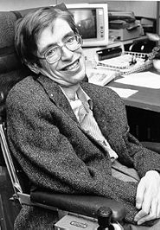
, CBE
, FRS, FRSA (born 8 January 1942) is an English theoretical physicist
and cosmologist
, whose scientific books and public appearances have made him an academic celebrity. He is an Honorary Fellow of the Royal Society of Arts, a lifetime member of the Pontifical Academy of Sciences
, and in 2009 was awarded the Presidential Medal of Freedom
, the highest civilian award in the United States.
Hawking was the Lucasian Professor of Mathematics at the University of Cambridge for 30 years, taking up the post in 1979 and retiring on 1 October 2009.
He is now Director of Research at the Centre for Theoretical Cosmology in the Department of Applied Mathematics and Theoretical Physics at the University of Cambridge.
There ought to be something very special about the boundary conditions of the universe and what can be more special than that there is no boundary?![]()
What I have done is to show that it is possible for the way the universe began to be determined by the laws of science. In that case, it would not be necessary to appeal to God to decide how the universe began. This doesn't prove that there is no God, only that God is not necessary.![]()
We are just an advanced breed of monkeys on a minor planet of a very average star. But we can understand the Universe. That makes us something very special.![]()
I don't believe that the ultimate theory will come by steady work along existing lines. We need something new. We can't predict what that will be or when we will find it because if we knew that, we would have found it already! It could come in the next 20 years, but we might never find it. ![]()
All of my life, I have been fascinated by the big questions that face us, and have tried to find scientific answers to them. Perhaps that is why I have sold more books on physics than Madonna has on sex.![]()

